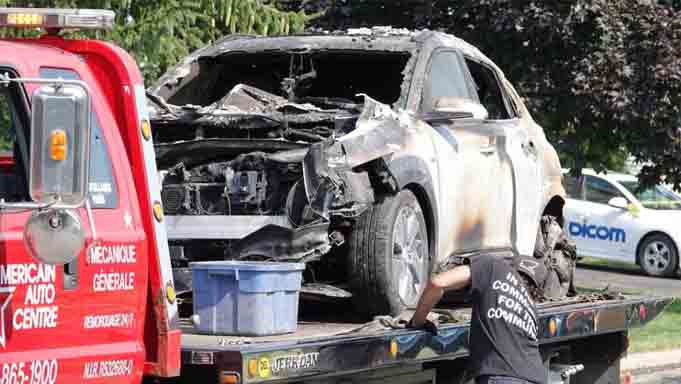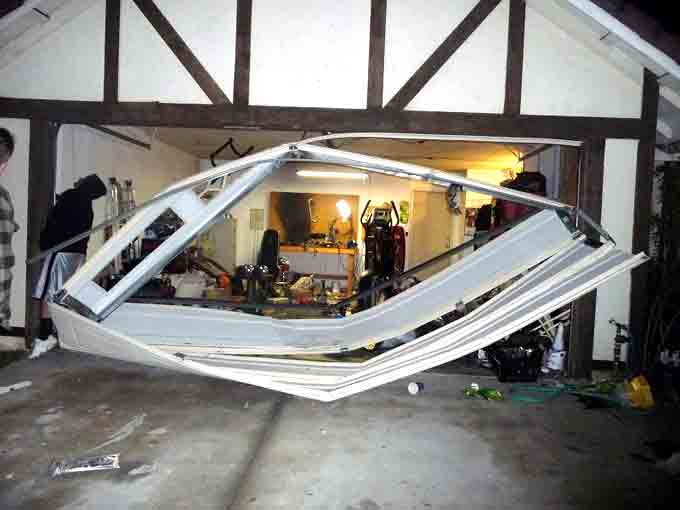The growing popularity of electric vehicles raises concerns about the safety of their lithium-ion batteries. On July 26, 2019, an electric car caught fire and exploded, blowing off the garage door in a suburb of Montreal and causing damage to the home’s garage and roof.
The vehicle involved was a Hyundai Kona, equipped with a lithium battery known for its vulnerability to overheating. Despite homeowner Piero Costentino’s claim that the battery was neither charging nor plugged in during the incident, Montreal’s fire service investigation found no apparent alternative causes for the explosion. At the time, Hyundai Canada was actively investigating the incident and collaborating with Montreal’s fire investigators.

This incident serves as a frightening example of the potential consequences when an explosion takes place inside a garage. “If we were in front of the garage door, we could have been in the hospital.” Piero said. Fortunately, no one was present near the garage during the incident.
Lithium Battery Catches Fire and Causes Explosion
In 2011, another individual found himself grappling with a similar explosion incident in his garage. Sharing his story, the photos illustrate just how devastating the damage can be, even when the cause of the explosion appears relatively small and simple.

According to the user, cmoney79, he had placed a 6s 5000mAH Zippy LiPo battery to charge in his garage. It wasn’t long after that his dog potentially alerted him to the problem. As he was taking his dog outside, he heard what he describes as a knocking sound coming from the garage. He was about 15 feet away from it when the explosion occurred and wrote: “sudden BOOM door blast open and big orange ball of fire rush in. I run out, and I see several small fires burning throughout the garage and the garage door blown off.”
The person was able to put the fire out using a pair of shorts from the laundry bin and noted that he believes that a can of spray paint may have led to the flash fire, and the explosion caused the garage door to blow off. However, the fire chief who investigated the case noted that it’s unlikely that a spray paint had caused an explosion with such intense force.
What Connects Both Garage Incidents?
In both explosion incidents, there is no officially confirmed cause, but a common factor links them: a lithium battery. In the case of the Hyundai explosion in Montreal, the homeowner stated that the vehicle was not charging at the time. Conversely, in the second incident, the explosion that blew off the garage door occurred as the lithium polymer (LiPo) battery was charging.
Lithium polymer batteries, commonly known as LiPos, are rechargeable and widely used in various consumer products, including cell phones, laptops, scooters, radio-controlled equipment, remote-controlled vehicles, battery backups, electronics, and electric vehicles like the Hyundai Kona mentioned earlier.
When charged improperly, punctured or damaged, lithium-ion batteries can pose a fire hazard. Despite being a staple in numerous consumer products, the technology is continuously evolving and innovators are also focused on improving features such as fire resistance.
The Effects of Blast Pressure on Garage Doors and the Human Body
The CDC has studied this issue and provides detailed research information that sheds light on the potential impacts of such an incident. Although their research primarily focuses on the effects of mining explosions and the bodily harm that can result for miners, the same methodology applies.

The physical impacts on the body vary depending on several factors and are determined by estimating or calculating the peak overpressure and the maximum wind speed. Based on the incident’s results and according to the findings (garage door blown out and moderate damage to the building), the explosion might have occurred with an approximate peak overpressure of 2 to 3 psi, or at a maximum wind speed of 70 to 102 mph.
Taking into account the weight of a typical garage door, which usually ranges from 120 to 360 pounds (custom, insulated, and energy-efficient garage doors can weigh more than 500 pounds), the explosion could have caused major to life-threatening injuries if someone were hit by the garage door.
How Many Electric Vehicle Fires Happen Annually?
While the figures are uncertain, a study suggests there were around 300 electric vehicle (EV) fires worldwide from 2010 to 2022. These numbers are not confirmed by any official source and could be subject to manipulation to support various agendas.
How Explosions Can Occur in Your Garage
The aforementioned explosion incidents might have occurred due to thermal runaway, an uncontrolled increase in temperature within a battery cell during normal operation. Elevated temperature can cause the battery to release flammable electrolytes, potentially leading to a fire. Overcharging, physical damage, manufacturing defects, or exposure to high temperatures can all contribute to a fire, ending in an explosion with the potential to blast off a garage door. In just a matter of minutes or even seconds, a fire can escalate rapidly, creating a dangerous and potentially deadly situation.
We can define an explosion as “a rapid increase in volume and release of energy in an extreme manner, usually with the generation of high temperatures and the release of gases.” Explosions in a residential building are not events that we typically expect to experience in our lifetime. However, they can and do occur.
Residential electrical issues, as reported by the ESFI, account for approximately 51,000 fires each year, 500 deaths, and $1.3 billion in property damage. In addition to potential electrical malfunctions, the garage is a place where flammable items are often stored.
The combination of flammable materials, oxygen, and fire can be devastating. Charging lithium batteries can add additional risks, accelerating the spread of fire and potentially causing more damage and injuries. The energy released during combustion can be so powerful that it has the potential to blow off an overhead garage door weighing in at hundreds of pounds.
The good news is that there are several steps you can take to mitigate the risks.
Proper Safety When Charging Batteries Inside Your Garage
Follow these steps to ensure safe handling of lithium batteries when charging an electric vehicle or other equipment in your garage.
- Only use the charger that comes with the battery or one that is designed specifically for rechargeable lithium batteries.
- Do not store lithium-ion batteries in spaces that are damp, wet, or hot. Keep them out of basements and bathrooms.
- Do not keep batteries stored in direct sunlight, as they can explode when stored in extreme light or heat.
- Keep batteries away from flammable items.
- Ensure that your garage is well ventilated.
- Follow the manufacturer’s instructions and safety precautions when charging the battery.
- Make sure the charger is connected to the battery correctly.
- Install a smoke detector inside the garage.
According to Green Car Reports, you can charge an electric vehicle with 120-Volt charging cords, but ideally, it is recommended to use a 240-Volt Level 2 charging station. Contact the manufacturer or a licensed electrician to upgrade your garage’s electrical system, then purchase a charging station and securely mount it on the wall.
How to Reduce the Risk of Fire and Explosion in Your Garage
From 2016 to 2019, the estimated number of residential fires was 368,500 every year, with the potential to cause an explosion. There are several ways to reduce and mitigate these risks:
- Handling of Flammable Items: Utilize shelving in the garage to organize and store flammable items. Keep them in an area away from appliances like the washing machine, dryer, and hot water heater. Ensure they are also stored out of reach of children.
- Storage of Flammable Items: Keep chemicals and flammable products such as gas, oil, paint thinner, weed killer, propane, paints, etc., out of the home and garage. Use a shed in the yard for the safe storage of these items. Ensure the shed is locked when not in use for additional safety.
- Labeling of Combustible Liquids: Ensure that all combustible liquids are clearly labeled and stored in durable containers with tightly closed lids. Never mix liquids or combine them into the same containers.
- Battery Charging: When charging equipment and batteries, only plug one into the outlet at a time. Remove the plug once the item has fully charged, as overloaded outlets can pose a hazard. Adhere to the manufacturer’s instructions.
- Organization and Declutter: Maintain a tidy and well-organized garage. Clutter can serve as fuel for a fire, so avoid stacking items and keep the garage in a state of organization. Use shelving to store and organize items in an orderly manner. Keep items elevated off the floor and discard items that are not in use or needed.
- Avoid the Use of Extension Cords: Plug items directly into the outlet using the cord attached to the item. Do not use extension cords for charging or to power the garage door opener.
- Clean Up: If you use your garage as a workshop or are working on a project in the space, always clean up after you’re finished. Even if you intend to pick up the work again at a later time, store away the items you’ve used safely and securely. Don’t leave oil-soaked rags out in a pile or place them in a bin. Safely dispose of chemicals that are no longer needed.
- Proper Maintenance: Keep the garage door in good working order and well-maintained. Address any necessary garage door repairs in a timely manner. Ensure that your garage vents aren’t blocked and that the garage is ventilated properly.
- Install Heat Alarm in the Garage: A heat detector is separate and different from the regular smoke detector. It is used to detect the presence of heat or a rise in temperature, providing early warning of a potential fire.
- Electrical System Safety: Regular inspections of your EV charging port, the garage door opener outlet, appliances, and the garage’s electrical system overall can help identify potential hazards and allow for repairs to be made before they become dangerous.
It is also recommended to have an updated fire extinguisher in the garage or within reach, promptly clean up oil and gas leaks from vehicles, and refrain from smoking or barbecuing in the garage, especially if you store flammables and batteries inside.
Regular Garage Door Maintenance and Inspection
Getting your garage inspected every year is one way to ensure that the space is safe. In the event of an explosion, a broken or damaged garage door could pose an even greater threat. Having a solid, secure garage door that is correctly installed and maintained allows for safe and efficient exit in case of an emergency, enables better ventilation, and provides a more secure closure.
As the world shifts towards cleaner energy in an effort to reduce global warming, the usage of rechargeable lithium batteries and the popularity of electric vehicles are increasing. However, this increasing usage is accompanied by the aforementioned risks, which is a concern for homeowners who regularly charge their vehicles inside their garage. Being aware and understanding the causes is the first step to mitigate the risks and protect your home and family.







